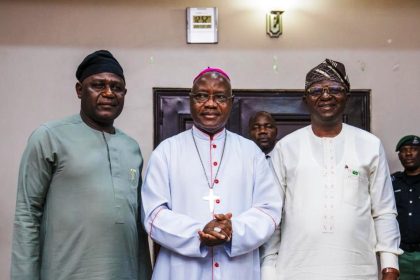How Google, NITDA, and Data Science Nigeria plan to teach students in Kaduna AI in Hausa
On April 30, 2024, Google partnered with the Kaduna State Government, the National Information Technology Development Agency (NITDA), and Data Science Nigeria to launch an animated series in Hausa that will teach students how to use AI tools.
“We insist on doing things in English, but it is not the model used by some other parts of the world. China and India, for example, taught their population in their local languages,” said Ahmed Yusuf Tambuwal, Acting Director, Digital Literacy and Capacity Building at NITDA.
Similarly, late Dr. Ogbonnaya Onu, former Minister of Science and Technology, announced a plan to replicate this model in 2017.
The plan was to teach primary and secondary school students science, technology, engineering, and mathematics (STEM) subjects in indigenous languages to foster interest in those subjects.
However, nothing became of the plan. While it is not clear why, there are a couple of reasons why it was a bad idea. For example, some classes would have had students from diverse ethnic groups that did not speak the same local language as the teacher.
Interestingly, Cynthia Bryte-Chinule, Founder of PEEL Initiative — a non-profit organisation particularly interested in improving education in Africa — had more luck teaching mathematics in Igbo and Pidgin English.
This was only possible because of Bryte-Chinule”s approach and targeted demographic.

Be the smartest in the room
Join 30,000 subscribers who receive Techpoint Digest, a fun week-daily 5-minute roundup of happenings in African and global tech, directly in your inbox, hours before everyone else.
She didn’t actively teach Igbo in class because not every student understood the language. She told Techpoint Africa in 2018 that she taught over 40 Port Harcourt kids, most of whom were school dropouts who did not understand English.
For those who could, she created video tutorials on YouTube and Facebook.
Google and the Kaduna State Government have adopted this approach. A video series in Hausa is available online for those who speak the language.
How it will work

The 40-video series contains seven-minute long videos that students can access online just like Bryte-Chinule’s students did.
However, Data Science Nigeria CEO, Bayo Adekanmbi, revealed that students can also access the animated video series through NITDA’s learning management system portal which tests the students after every video, and issues a certificate if they score up to 75% at the end of the series.
“They will be available in primary and secondary schools, copying centres where people copy movies, and at our partner hubs,” for students who do not have devices to access the series.
Teachers in the National Youth Service Corps (NYSC) are also encouraged to have the videos on their devices, thus creating more points of access for the students.
Why AI?
“Artificial intelligence is the biggest thing that is happening across the world today. It could be the basis for differentiating nations in the next 10 to 20 years. If AI will become important to our well-being and welfare, everybody must be empowered to understand what it is,” Adekanmbi said.
Google West Africa Director, Olumide Balogun, also corroborated this by saying AI could help Nigeria develop sectors where major developments are still lacking.
“When people think about AI, they think about robotics and things that a very geeky. But here in the North, we’re already using AI for flood forecasting, prenatal care, and things like disease control.”
He also mentioned that AI could help with education, where students learn in their local languages just like the video series that has been created for them.
The improvements we’ve seen in AI will always re-echo conversations about what it means for various aspects of human life, from our jobs to relationships. However, the focus for Google and its other partners involved in the creation of the AI video series is helping people better their lives by using AI tools.
Speaking about the impact it has had on some of the trainees, Balogun gave an example of a businesswoman who has generated prompts in response to customer queries and others who are using it to increase their prospects as employees.
Teaching students to use AI tools is one of the many initiatives that have been deployed to help Kaduna State embrace tech as part of the bigger picture — to see the state become a tech hub in Nigeria.
Balogun revealed that the AI for beginners learning video series is an offshoot of Google’s ₦1.2 billion commitment in 2023 to developing female talents in Nigeria.
He mentioned that 3,400 girls have already been trained out of the 20,000 the budget plans to cover.
At the unveiling of the AI for beginners learning video series, some of these 3,400 girls, trained under an intervention by Data Science Nigeria — Arewa Ladies4Tech — shared how the training has transformed their lives.

From the data scientist to the developer, they shared how they were hired or improved their businesses with their newly acquired skills.
The limitations
In August 2023, Kaduna became the first state in Nigeria to domesticate the Nigerian Startup Act.
According to Shuaibu Kabir Bello, Senior Special Assistant on ICT to the Kaduna State Government, “the bill is now a law in Kaduna.”
This move and the partnership are geared towards making Kaduna a tech hub. The Commissioner for Kaduna State Ministry of Business, Patience Fakai, also noted that the state is in the process of releasing an ICT policy that would see it improve its chances of building and attracting the right minds for tech development.
But there are several limitations to Kaduna’s tech hub dreams.
While policies and Acts are a great place to start, the problem has always been enforcement. Ridwan Abdullateef, a film-maker resident in Kaduna, told Techpoint Africa last year that there’s also a need for funding.
Interestingly, former Governor of Kaduna State, Nasir El-Rufai, announced plans to launch a $100 million fund aimed at diversifying startup investments in Nigeria beyond Lagos. Since then, not much has been heard about how it is being deployed.
Besides funding, security is perhaps the biggest limitation to Kaduna and the North’s startup ecosystem growth.
Although Fakai is adamant that security has greatly improved, Abdullateef said that people coming from Abuja still ask questions like “how do you guarantee our safety?”

Improving tech talent in the North could be achieved with initiatives like Arewa Ladies4Tech and videos that teach AI in Hausa, but the big picture of making Kaduna a tech hub is a hurdle that will require a lot more than video tutorials to scale.







